

8 Google Sheets Add-ons Every Teacher Should Know About. July , 2017 Google Sheets add-on store features a number of educational extensions to use with your forms and spreadsheets to add amazing functionalities.
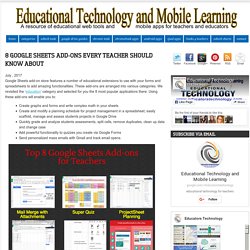
These add-ons are arranged into various categories. We revisited the ‘education’ category and selected for you the 8 most popular applications there. Ed-tech product roundup: July, ISTE 2015. Nearly 16,000 educators from around the world gathered in Philadelphia earlier this month for ISTE 2015.
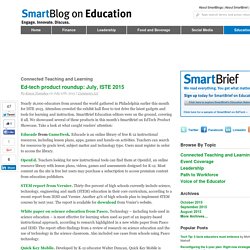
Attendees crowded the exhibit hall floor to test drive the latest gadgets and tools for learning and instruction. 4 Features to Look for in a 21st Century LMS. Learning Management Systems 4 Features to Look for in a 21st Century LMS.
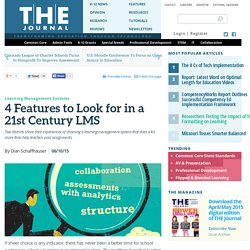
Is Minerva the Future of College? America Tonight A world-class neuroscientist and former dean of social sciences at Harvard, Kosslyn says Minerva doesn’t teach traditional subjects like math or biology.

Instead, students spend their first year taking small seminar courses, with titles like Formal Analyses and Complex Systems, designed to teach critical thinking skills rather than content. Four liberal arts colleges, early to the MOOC scene, form online education consortium. The first four liberal arts colleges to join the massive open online course provider edX are forming a consortium to improve teaching both online and on campus.
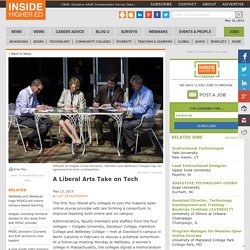
Administrators, faculty members and staffers from the four colleges -- Colgate University, Davidson College, Hamilton College and Wellesley College -- met at Davidson’s campus in North Carolina in February to discuss a potential consortium. At a follow-up meeting Monday at Wellesley, a women’s college in Massachusetts, the colleges signed a memorandum of understanding forming the as yet unnamed consortium, laying the groundwork for closer collaboration between the liberal arts colleges. Two schools of thought emerged from the February meeting, said Patrick Sellers, vice president for strategic partnerships and professor of political science at Davidson.
Teens without smartphones encounter a new digital divide. In this digital age, we have assumed that smartphones and apps are the new normal for youth.
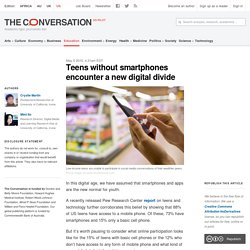
A recently released Pew Research Center report on teens and technology further corroborates this belief by showing that 88% of US teens have access to a mobile phone. Of these, 73% have smartphones and 15% only a basic cell phone. But it’s worth pausing to consider what online participation looks like for the 15% of teens with basic cell phones or the 12% who don’t have access to any form of mobile phone and what kind of a new “digital divide” might be emerging.
In other words, low-income teens are unable to participate in the social media conversations of their wealthier peers. How Can Edtech Close the Book on Summer Brain Drain? Among educators, summer "brain drain" is a constant pain point.
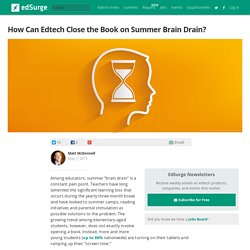
Teachers have long lamented the significant learning loss that occurs during the yearly three-month break and have looked to summer camps, reading initiatives and parental stimulation as possible solutions to the problem. The growing trend among elementary-aged students, however, does not exactly involve opening a book. Instead, more and more young students (up to 66% nationwide) are turning on their tablets and ramping up their “screen time.” While no one advocates spending the whole summer on a mobile device, educators need to capitalize on this untapped educational resource, rather than cast screen time as a foe. There is a wide array of valuable digital content that, if made available prior to the final bell, can help combat one of the more intractable problems in education: the widening of the achievement gap during summer months. The academic backslide Mobile content: the great equalizer. Care About Educational Equity? Then You Should Care About Mobile.
EdSurge Newsletters Receive weekly emails on edtech products, companies, and events that matter.

Consider the following information. Mobile devices now outnumber the 7 billion human beings on earth, and there are nearly 2 billion smartphones in use. 5 Lecture Capture Hacks for More Engaging Videos. Flipped Classroom 5 Lecture Capture Hacks for More Engaging Videos The best flipped courses provide students with compelling, interactive learning content to hold their attention outside of class.
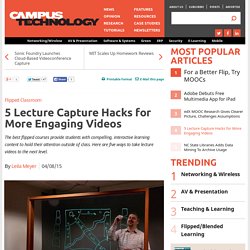
Here are five ways to take lecture videos to the next level. Positively Smashing Part III: ThingLink and Tackk. And so the good news is… Stuff just got a little “tackk-y” on the edtech scene.
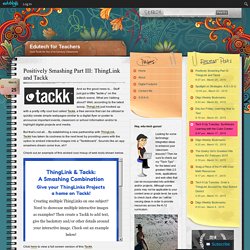
3 benefits of mobile learning you’re not leveraging. Are you harnessing the full power of your mobile learning devices? MOOCs and Anti-MOOCs. Part 4 of my Top 10 Ed-Tech Trends of 2013 series Barely a week has gone by this year without some MOOC-related news. Much like last year, massive open online courses have dominated ed-tech conversations. 80 Ways to Use Google Forms to Support Learning. 5 Tips for Classroom Management With Mobile Devices. When adopting technology in the classroom, one of the key concerns for teachers and administrators is classroom management.
Top 10 eLearning Statistics for 2014 Infographic. New eBook: 158 Tips on mLearning: From Planning to Implementation by Jennifer Neibert. By Jennifer Neibert October 15, 2013 “In the process of developing and implementing mLearning, many learning professionals have discovered what works and what doesn’t. The good news is that many of the skills necessary for creating excellent eLearning have also proven valuable for creating excellent mLearning, but there are new skills we need to develop, too.”
To provide you with the most current knowledge on mobile learning, The eLearning Guild is offering a free eBook, 158 Tips on mLearning: From Planning to Implementation. Top 5 Design Considerations for Creating Mobile Learning. 9 Mobile Learning Lesson Plans. 12 Principles Of Mobile Learning. Ed-Tech Cheat Sheet. Keeping up with all of the latest trends in technology can be quite exhausting.
It seems as if every other week there is another new device, term, or concept that is sweeping through Twitter, Facebook, and industry publications. What Do Parents Think About Mobile Learning? Photo credit: iStockPhoto. 6 Tips on Designing Courses for iPad with Articulate Storyline. 6 Examples Of Successful Classroom Tablet Integration. In an unplanned series of sorts, we’re showcasing a couple of posts about the 2013 NMC/EDUCAUSE Learning Initiative Horizon Report for Higher Education . We’ve already talked about the key trends in the report and some challenges we face in implementing education technology , so we’re ready to take a look at the six technologies highlighted in the report as being game-changers for education. New Guide! Mobile Devices for Learning: What You Need to Know.
Kids Go Gaga Over Tablets [INFOGRAPHIC] We know the iPad has become a major hit with adult tech consumers since Steve Jobs first introduced the gadget back in 2010. A must Have Educational Technology Cheat Sheet. How The iPad Is Being Used For Mobile Learning. UW-Stout Mobile Learning News.